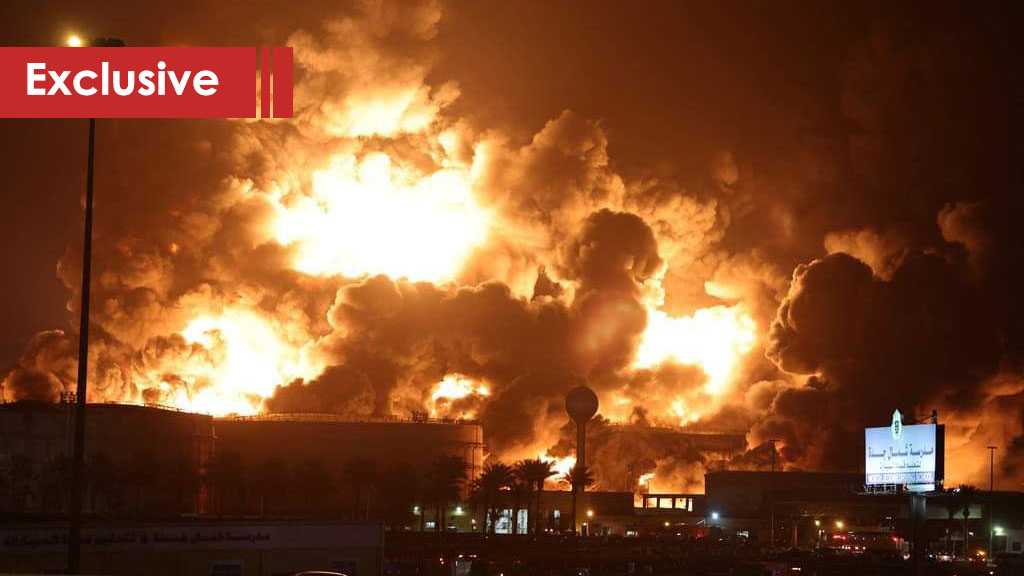By Mohammad Sleem

Given the right to respond to the escalation of the Saudi-led aggression and its blockade, the Yemeni Armed Forces announced the implementation of a series of “Breaking the Siege” operations, targeting the bedrock of the Saudi economy in the capital Riyadh as well as in Jizan, Abha and other key cities.
The whole ongoing process that has started a week before the 7th anniversary of the war on Yemen, on the level of timing, reflects important messages as it inaugurates a new phase of painful and significant operations that might turn the table upside down.
Between the lines, Operation “Breaking the Siege I” revealed the Armed Forces’ capability to carry out qualitative operations in the Saudi and Emirati depths at a high pace and extreme accuracy, revealing an excellent capability of Yemen’s Rocketry Force and Propelled Air Force.
It also exposes the humiliating failure of the Saudi-led coalition to disrupt and target such capabilities or reduce their effectiveness. Even more, many political analysts mocked the previously-released statements on the other side’s readiness to prevent any operation by the Yemeni Armed Forces in Saudi Arabia and the UAE.
Furthermore, the series of operations revealed that the Yemeni military industrialization capabilities are not adversely affected by the embargo imposed by the countries of aggression and that Yemen has both the local expertise and skills that enable it to manufacture and develop these technologies and be self-sufficient in this regard.
A new equation was set by the Yemeni Armed Forces: “oil for oil.” And as Yemen has suffered for nearly seven years from siege and fuel shortage, the countries of aggression and their operators must suffer the same as the Yemeni people have been for years. Had they wanted the Yemeni Rocketry Force and the Air Force to stop their deterrence operations, the have first to stop their aggression and lift their siege.
Operation “Breaking the Siege II” represented a very important process on both levels of influence and timing, and put more political and military important equations into effect.
The operation was special for expanding the targeting range from Yanbu to Riyadh to the southern provinces of Abha, Jizan and Khamis Mushait. Additionally, the targets varied between economic and vital, not to mention other sensitive sites the Yemeni Armed Forces didn’t disclose. The Saudi regime acknowledged the targeting of the desalination, and the power and gas plants in other areas; however, the Saudi Ministry of Energy acknowledged after the operation a decrease in production at Yanbu refinery.
The operation was in the course of the natural response to the continuation of the suffocating siege on the Yemeni people, producing the world’s worst fuel crisis and exacerbated human suffering, and threatening the vital health and service sectors with complete paralysis.
Politically, it didn’t seem that Operation “Breaking the Siege II” was the last, as the Armed Forces were on set to any upcoming qualitative response, making Saudi oil facilities possible targets.
Moreover, Operation “Breaking the Siege III” took place as the 8th year of the war started. The operation targeted Saudi Aramco facilities in Jeddah, Ras Tanura, Rabag, Jizan and Najran, and extended to reach vital and sensitive targets in Riyadh, Abha and Khamis Mushait.
The frequency of the series of military operations confirms the fact that the US and Western air defense systems, which cost the Saudi-led coalition billions of dollars, have failed to monitor and intercept missiles and drones coming from Yemen.
After the latest operation four days ago, it has become clear that Saudi Arabia is no longer safe as it was before seven years. To make things worse, the Saudi Ministry of Energy acknowledged that there are serious implications for the production, processing, and refining sectors that will affect Saudi Arabia's oil production capacity.
Saudi Arabia is no longer what it was seven years ago ever since its sky was clouded by the flames caused by rockets and drones in a matter of ten days only.
A perfect timing of qualitative operations has led to an unprecedented increase in fuel prices to 130$ per barrel, leaving behind an equation announced by Ansarullah Leader Sayyed Abdul Malik al-Houthi some three days earlier: “Either you accept our offer for peace, or you won’t face but regret.”

No comments:
Post a Comment